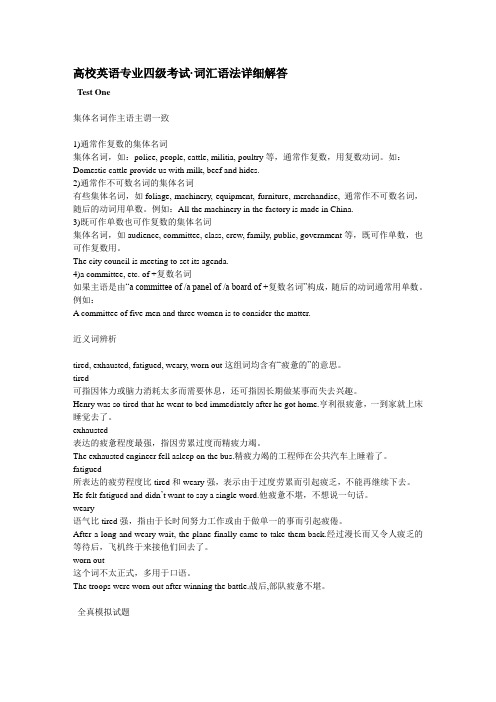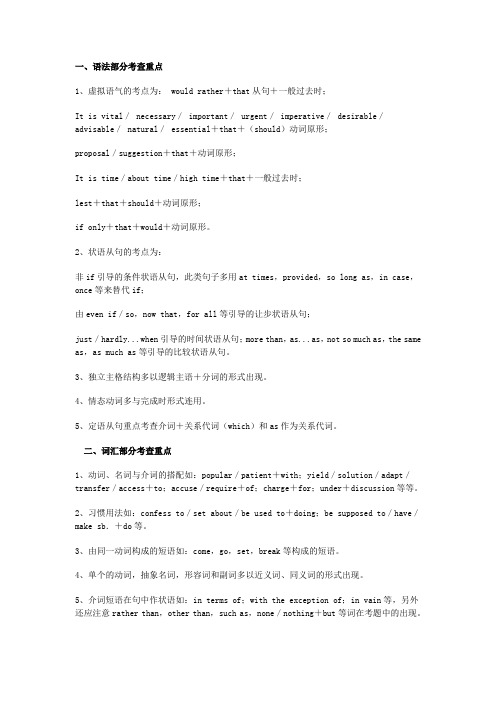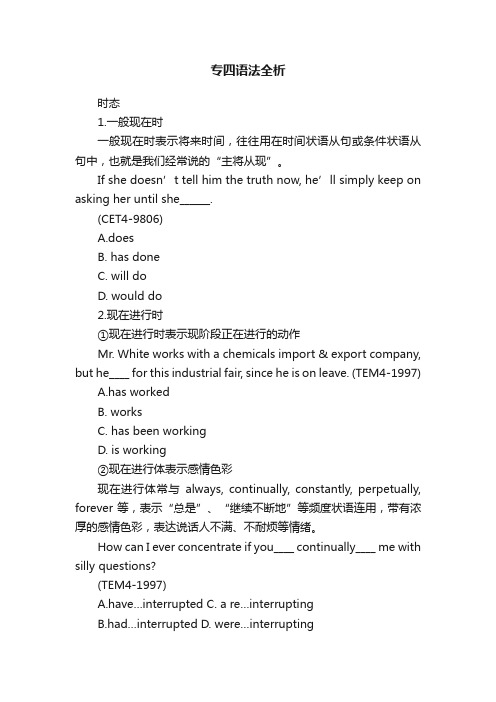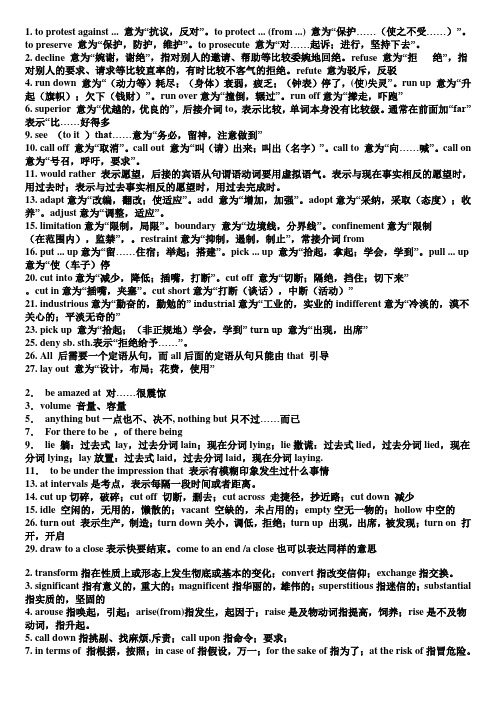最新完整版专四英语语法考点分析解析
专四语法 可可英语

专四语法可可英语好的,以下是一篇有关可可英语专四语法的文章:可可英语专四语法精讲一、虚拟语气虚拟语气是英语语法中一个非常重要的部分,在专四考试中也是必考的知识点。
虚拟语气用来表示与实际情况相反的情况或者表达主观上的愿望、建议、猜测等。
虚拟语气的用法包括与现在事实相反、与过去事实相反和与将来事实相反三种情况。
1. 与现在事实相反:使用动词的过去式(be动词用were),从句使用would+动词原形。
例如:If I were you,I would choose to study abroad.(如果我是你,我会选择出国留学。
)2. 与过去事实相反:使用“would+have+过去分词”,从句使用“had+过去分词”。
例如:If we had known the answer,we would have told you.(如果我们知道答案,我们早就告诉你了。
)3. 与将来事实相反:使用“would+动词原形”,从句使用“were+to+动词原形”或者“should+动词原形”。
例如:If it were to rain tomorrow,the football match would be postponed.(如果明天下雨,足球比赛就会被推迟。
)二、定语从句定语从句是英语语法中的另一个重要知识点,也是专四考试的重点。
定语从句用来修饰名词,通常放在所修饰名词之后。
引导定语从句的关联词包括that、which、who、whose等。
1. 使用that的情况:当先行词为all、something、nothing、this等不定代词时,或者先行词被形容词最高级修饰时,多用that引导定语从句。
例如:This is the most interesting book that I have ever read.(这是我读过的最有趣的书。
)2. 使用which的情况:当引导词前面有逗号或放在句末时,通常使用which。
英语专业四级考试语法精讲[1]
![英语专业四级考试语法精讲[1]](https://img.taocdn.com/s3/m/a66f1368561252d380eb6e8d.png)
英语专业四级考试—语法精讲虚拟语气第一部分:概述虚拟语气类型(宾语从句;状语从句;名词性从句(主语从句,同位语从句,表语从句);定语从句;特殊类型(感叹句);省略if 的虚拟法(倒装))ExamplesThe rapid change of society requires that college students adapt to the world outside campus by getting to know the society.I would rather that you did nothing for the time being.I wish that I were a student again.I wished that I had followed his suggestion.名词性从句中的虚拟主语从句(it is +adj./p.p that)同位语从句(The +n. that )表语从句(n. +be that)省略if 的虚拟法(倒装)(1)虚拟语气中如果从句引导词if / whether 省略,从句中需要倒装,提前助动词(系动词)或情态动词。
Eg. If it should rain tomorrow, we would not be able to have the sports meeting.=Should it rain tomorrow, we should not be able to have the sports meeting.省略if 的虚拟法(倒装)(2)Eg. Whether it (may) be fine or rainy, we would have the sports meeting. =Be it fine or rainy, we would have the sports meeting.If she had been given more information, she could have answered the questions.=Had she been given more information, she could have answered the questions.第二部分详解&总结虚拟语气的动词标志―insist, suggest, require, request, demand, propose, prefer, maintain, move,urge, recommend, command, order‖等动词表“建议、愿望”时,其后宾语从句中谓语动词要用虚拟语气。
高校英语专业四级考试_词汇语法详细解答

高校英语专业四级考试·词汇语法详细解答Test One集体名词作主语主谓一致1)通常作复数的集体名词集体名词,如:police, people, cattle, militia, poultry等,通常作复数,用复数动词。
如: Domestic cattle provide us with milk, beef and hides.2)通常作不可数名词的集体名词有些集体名词,如foliage, machinery, equipment, furniture, merchandise, 通常作不可数名词,随后的动词用单数。
例如:All the machinery in the factory is made in China.3)既可作单数也可作复数的集体名词集体名词,如audience, committee, class, crew, family, public, government等,既可作单数,也可作复数用。
The city council is meeting to set its agenda.4)a committee, etc. of +复数名词如果主语是由“a committee of /a panel of /a board of +复数名词”构成,随后的动词通常用单数。
例如:A committee of five men and three women is to consider the matter.近义词辨析tired, exhausted, fatigued, weary, worn out这组词均含有“疲惫的”的意思。
tired可指因体力或脑力消耗太多而需要休息,还可指因长期做某事而失去兴趣。
Henry was so tired that he went to bed immediately after he got home.亨利很疲惫,一到家就上床睡觉去了。
英语专四语法考点总结

一、语法部分考查重点1、虚拟语气的考点为: would rather+that从句+一般过去时;It is vital/ necessary/ important/ urgent/ imperative/ desirable/advisable/ natural/ essential+that+(should)动词原形;proposal/suggestion+that+动词原形;It is time/about time/high time+that+一般过去时;lest+that+should+动词原形;if only+that+would+动词原形。
2、状语从句的考点为:非if引导的条件状语从句,此类句子多用at times,provided,so long as,in case,once等来替代if;由even if/so,now that,for all等引导的让步状语从句;just/hardly...when引导的时间状语从句;more than,as...as,not so much as,the same as,as much as等引导的比较状语从句。
3、独立主格结构多以逻辑主语+分词的形式出现。
4、情态动词多与完成时形式连用。
5、定语从句重点考查介词+关系代词(which)和as作为关系代词。
二、词汇部分考查重点1、动词、名词与介词的搭配如:popular/patient+with;yield/solution/adapt/transfer/access+to;accuse/require+of;charge+for;under+discussion等等。
2、习惯用法如:confess to/set about/be used to+doing;be supposed to/have/make sb.+do等。
3、由同一动词构成的短语如:come,go,set,break等构成的短语。
CET4语法考点全解析

CET4语法考点全解析在准备英语四级考试的过程中,语法一直是考生们比较头疼的一个部分。
由于语法知识点众多,考试时往往容易混淆,因此,了解并掌握每个语法考点是非常重要的。
本文将对CET4考试中常见的语法考点进行全面解析,帮助考生在备考中有针对性地进行复习。
一、冠词冠词是英语中一种常见的虚词,包括定冠词“the”和不定冠词“a/an”。
定冠词“the”表示特指,常用于特定的人、事物或概念;不定冠词“a/an”表示泛指,常用于不特定的人、事物或概念。
在考试中,考生需要注意正确使用冠词,避免使用错误或遗漏。
二、时态英语时态是考试中的重要考点之一,主要包括一般现在时、一般过去时、一般将来时、现在进行时、过去进行时、过去将来时等。
考生需要根据句意和语境选择正确的时态,避免时态错误导致句子不通顺或不符合语法规则。
三、名词名词是英语中一种表示事物、人或概念的词汇,可分为可数名词和不可数名词。
在考试中,考生需要注意名词的单复数形式、所有格形式以及名词性从句的使用,避免在句子中出现名词错误。
四、动词动词是英语中一种表示行为或状态的词汇,主要包括一般动词、情态动词、动词的时态和语态等。
在考试中,考生需要注意动词的时态和语态的正确使用,避免主谓不一致或动词形式错误。
五、代词代词是英语中一种用来代替名词或其他词汇的词汇,包括人称代词、物主代词、反身代词等。
在考试中,考生需要注意代词的正确使用,避免在句子中出现代词错误或误解。
六、连接词连接词是英语中一种用来连接句子、短语或词汇的词汇,包括并列连词、从属连词和连接副词等。
在考试中,考生需要注意连接词的使用,保持句子逻辑性和通顺性。
七、介词介词是英语中一种用来表示位置、方向或关系的词汇,包括时间介词、地点介词和方式介词等。
在考试中,考生需要注意介词的正确使用,避免在句子中出现介词错误或误解。
总结:通过上述对CET4语法考点的全面解析,考生可以更好地理解和掌握英语语法知识,提高语法水平和应试能力。
专四语法全析

专四语法全析时态1.一般现在时一般现在时表示将来时间,往往用在时间状语从句或条件状语从句中,也就是我们经常说的“主将从现”。
If she doesn’t tell him the truth now, he’ll simply keep on asking her until she______.(CET4-9806)A.doesB. has doneC. will doD. would do2.现在进行时①现在进行时表示现阶段正在进行的动作Mr. White works with a chemicals import & export company, but he____ for this industrial fair, since he is on leave. (TEM4-1997)A.has workedB. worksC. has been workingD. is working②现在进行体表示感情色彩现在进行体常与always, continually, constantly, perpetually, forever等,表示“总是”、“继续不断地”等频度状语连用,带有浓厚的感情色彩,表达说话人不满、不耐烦等情绪。
How can I ever concentrate if you____ continually____ me with silly questions?(TEM4-1997)A.have…interrupted C. a re…interruptingB.had…interrupted D. were…interrupting③ be+being + 形容词状态动词be的进行时态(be being)后面接行为形容词brave, careful, stupid, clever, foolish, polite, kind和shy等,表示主语所表现的非一贯性特点或故意的行为或暂时出现的平时所没有的某种特质。
(完整版)专四语法专题复习:限定词解读

➢限定词与三类名词的搭配关系
➢限定词与限定词的搭配关系 ➢若干限定词用法比较
(1)能与三类名词搭配的限定词
有些限定词如the,some,any,no,other,whose以及my, your等物主限定词和名词属格(John’s,my friend’s)等能与三类 名词搭配。例如:
the book
either, neither, enough); • 5、疑问限定词和关系限定词: what (ever),
which (ever),whose
b) 前位限定词包括 all,both,half; double,twice,three times等; one-third,two-fifths等; what,such (a/ an) (跨类限定词)。
A. the other B. enough C. a little D. much
4. There’s _C_ water in the bottle.
A. few B. a number of C. plenty of D. any
5. There is _C_ iron in this mine than in that one.
7. He has published _B_ short stories in English.
A. a great amount of B. a number of C. another D. many a
8. We had _D_ rainfalls last summer.
A. too much B. little C. a little D. only several
both workers
(a) few words
专四语法(做完题总结)解读

1. to protest against ... 意为“抗议,反对”。
to protect ... (from ...) 意为“保护……(使之不受……)”。
to preserve 意为“保护,防护,维护”。
to prosecute 意为“对……起诉;进行,坚持下去”。
2. decline 意为“婉谢,谢绝”,指对别人的邀请、帮助等比较委婉地回绝。
refuse 意为“拒绝”,指对别人的要求、请求等比较直率的,有时比较不客气的拒绝。
refute 意为驳斥,反驳4. run down 意为“(动力等)耗尽;(身体)衰弱,疲乏;(钟表)停了,(使)失灵”。
run up 意为“升起(旗帜);欠下(钱财)”。
run over意为“撞倒,辗过”。
run off意为“撵走,吓跑”6. superior 意为“优越的,优良的”,后接介词to,表示比较,单词本身没有比较级。
通常在前面加“far”表示“比……好得多9. see (to it )that……意为“务必,留神,注意做到”10. call off 意为“取消”。
call out 意为“叫(请)出来;叫出(名字)”。
call to 意为“向……喊”。
call on 意为“号召,呼吁,要求”。
11. would rather 表示愿望,后接的宾语从句谓语动词要用虚拟语气。
表示与现在事实相反的愿望时,用过去时;表示与过去事实相反的愿望时,用过去完成时。
13. adapt意为“改编,翻改;使适应”。
add 意为“增加,加强”。
adopt意为“采纳,采取(态度);收养”。
adjust意为“调整,适应”。
15. limitation意为“限制,局限”。
boundary 意为“边境线,分界线”。
confinement意为“限制(在范围内),监禁”,。
restraint意为“抑制,遏制,制止”,常接介词from16. put ... up意为“留……住宿;举起;搭建”。
- 1、下载文档前请自行甄别文档内容的完整性,平台不提供额外的编辑、内容补充、找答案等附加服务。
- 2、"仅部分预览"的文档,不可在线预览部分如存在完整性等问题,可反馈申请退款(可完整预览的文档不适用该条件!)。
- 3、如文档侵犯您的权益,请联系客服反馈,我们会尽快为您处理(人工客服工作时间:9:00-18:30)。
语法考点之一:虚拟语气考点1. If从句中的虚拟语气1、与过去事实相反:从句sb had done,主句sb would(should, could, might)+ have done;2、省略if,从句的语序用到装,即将were, had或should移至主语的前面,但否定词not不前移。
3、与将来事实相反:从句sb did (should+do或were+to do),主句sb would (should, could, might)+do。
4、错综条件句:主句与从句的动作发生在不同的时间段。
比如:从句对过去虚拟,而主句对现在虚拟,即从句sb had done,主句sb would(should, could, might)+do;考点2:表示建议、要求、命令等动词如insist, order, command, suggest, advise, propose, ask, require, request, demand引导的从句及it引导的相应的分词、名词和形容词从句,谓语用(should)+动词原形。
考点3:It is +advisable, essential, important, imperative, incredible等从句,谓语用(should)+动词原形。
考点4:it is (high/about) time that的结构中,从句使用一般过去式。
例如:考点5:much as"尽管,虽然"引导让步状语从句,从句中用would have done表示假设。
考点6:if only, wish, as if/as though引导从句,与过去事实相反:had + done;与现在事实相反:动词过去式;与将来事实相反:could/would + do考点7:would rather/sooner从句中使用一般过去式或过去完成式分别表示对现在或过去的虚拟考点8:lest / for fear that+(should ) +原形动词。
语法考点之二:情态动词*情态动词: will(愿意), shall(将), must(必须), can, may, would, should (应该), might, could, ought to, used to(过去常常), need(需要), dare(竟敢),have to(不得不)考试中,情态动词部分重点测试以下内容:(1)情态动词+行为动词完成式(表示推测)(2)某些情态动词的特殊用法考点1. 情态动词+have+过去分词结构表示推测(1) must have done表示推测过去某事“一定”发生了。
否定形式为:can’t / couldn’t have v-ed, 表示过去不可能发生某事。
(2) could have done表示推测过去某动作“很可能”发生了。
(3) may / might have done 表示推测过去某事“也许”发生了.(4) ought to / should have done 和ought not to / shouldn’t have done用于对已发生的情况表示“责备”、“不满”,分别表示“本应该…”和“本不应该…”(5) needn’t have done 表示过去做了某事,但没有做的必要,意为“本没必要…”。
*did not need to do 动作并没发生。
考点2. 特殊用法(1) should 表示惊讶1. I am surprised__ this city is a dull place to live in.2006A. that you should thinkB. by what you are thinkingC. that you would thinkD. with what you were thinking(2) Can’t but + V.,表示不得不,与have to同义。
Can’t help +Ving忍不住。
(3) cannot … too / enough 表示“无论怎么……也不算过分”、“越……越好”(4) may/ might as well + 动词原形”意为“最好,满可以,倒不如”,相当于had better(5) may well + 动词原形”,意为“(完全)能,很可能”(6) may as well as还是…好了语法考点之三:非谓语动词考点1:不定式(1) 考察哪些动词接不定式;(2) 考察哪些短语接不带to的不定式;Had better/had bestWould rather/would rather … than/rather than/would sooner/would sooner…thanCannot but/cannot help but/do nothing but/do nothing besides/do nothing thanWhy引导的疑问句(3)考察动词不定时的时态和语态:进行式to be doing,完成式to have done;一般式被动语态to be done;完成式被动语态to have been done。
另外,不定式短语有将来时的意思;考点2:动名词(1)常接动名词做宾语的词:mind(介意), miss(逃过), mention(提及), prevent, postpone, practice, risk(冒险),resist(抵制), consider(考虑), admit(承认), avoid(避免), appreciate(感激), fancy(幻想), finish(完成),feel like(喜欢), escape(逃脱), ensure(确保) , delay(延迟), deny(否认), resent, detest, imagine(想象), suggest(建议) (2)介词后的ing:prevent/stop/keep sb /sth from doing 阻止…做…spend/waste time /money in doing 在做…方面花钱、浪费时间或金钱;how /what about doing sth 做…怎么样了?Have some difficulty/trouble in doing 在…方面有些困难;There is no sense in doing (做…是没有理由的)Thank / admire /praise/blame /scold/ punish sb for doing sth因做某事而感谢、羡慕、表扬、责备、惩罚某人(3)接动名词做介词to 的宾语:apply oneself to致力于;be accustomed to习惯于;confess to供认;come to谈到;devote oneself to献身于;get down to着手做;give way to 对…让步;lead to导致;look forward to期待;next to几乎;object to反对;pay attention to注意;stick to坚持;stand up to勇敢面对;turn to求助于;be used to习惯于考点3:分词(1)从语态上看,现在分词一般表主动,过去分词一般表被动;(2)从时态上看,现在分词表示进行,过去分词表示过去。
如果分词动作发生在句子谓语动词动作之前,分词用完成时。
(3)现在分词的否定形式是not放在分词之前。
*非谓语动词解题三步曲:一、首先确定主句;二、分析主动被动;三、分析动作先后1. _____ should not become a serious disadvantage in life and work.2010A. To be not tallB. Not being tallC. Being not tallD. Not to be tall2. "The man preparing the documents is the firm's lawyer" has all the following possible meanings EXCEPT . 2009A. the man who has prepared the documents...B. the man who has been preparing the documents...C. the man who is preparing the documents...D. the man who will prepare the documents...3. ______ at in this way, the situation does not seem so desperate.2000A. LookingB. lookedC. Being lookedD. to look4. If not ____ with the respect he feels due to him, Jack gets very ill-A. being treatedB. treated5. ______, he can now only watch it on TV at home. 1998A. Obtaining not a ticket for the matchB. Not obtaining a ticket for the matchC. Not having obtained a ticket for the matchD. Not obtained a ticket for the match6. He wasn’t asked to take on the chairmanship of the society, ______in sufficiently poplar with all members.1996A. having consideredB. was consideredC. was being consideredD. being considered7. He noticed the helicopter hovering over the field. Then to his astonishment, he saw a rope ladder______ out and three men climbing down it. 1995A. throwingB. being thrownC. having thrownD. having been thrown8. This missile is designed so that once _____nothing can be done to retrieve it.1995A. firedB. being firedC. they firedD. having fired考点4:独立主格(句中没有连接词,逗号分开两个句子,存在两个主语。
